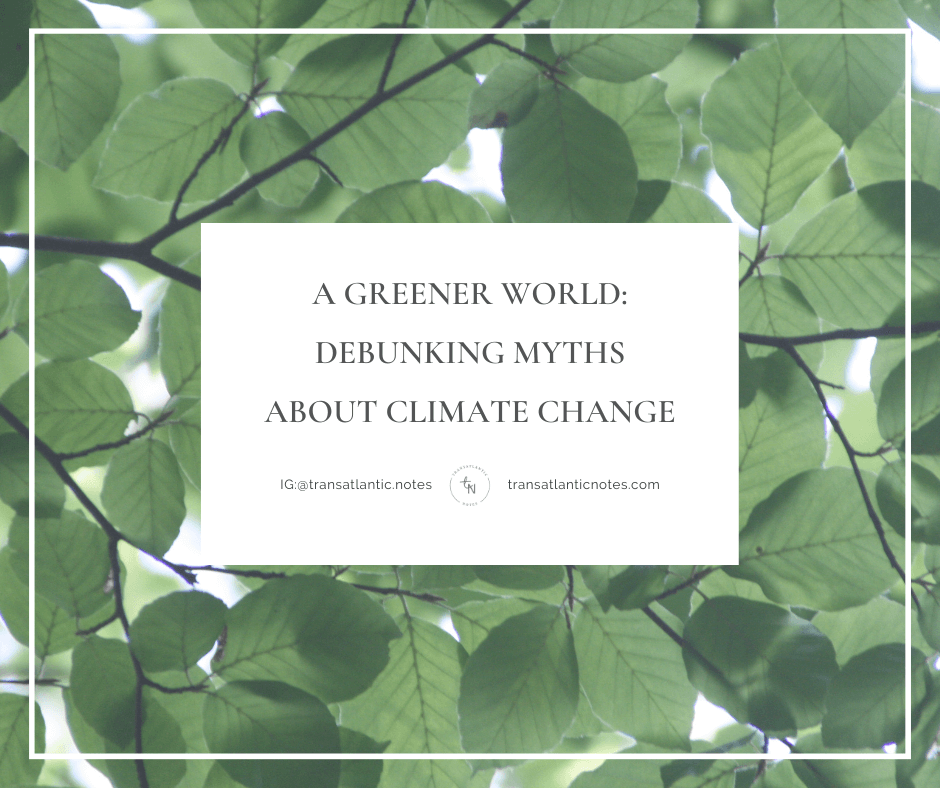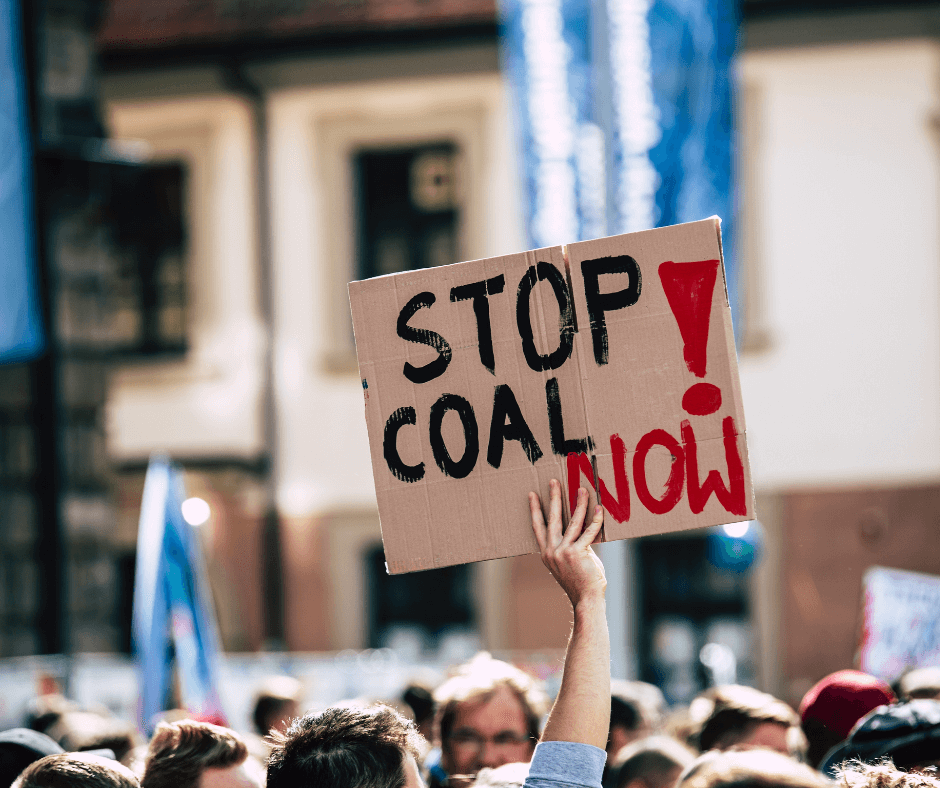Misinformation online about climate change has almost become ubiquitous; because of this, addressing and dispelling these myths remains critically important. Understanding the stakes and promoting accurate information are paramount to fostering a sustainable future for generations to come.
Bringing awareness to the many issues our planet currently faces is why I joined the Climate Change Collective; a group of environmentally-minded bloggers who want to share motivational and informative climate action news.
Created by Michelle from Boomer Eco Crusader and Jamie of Jamie Ad Stories; each month a different member of the collective takes turns to write a lead/focus post that shares key information about climate change. Once published, the rest of the group links to it in a response-style post on their own sites, discussing their thoughts and ideas about the information/issues raised.
The collective is currently open to any other bloggers who want to join; if you’re interested, get in touch.

Collective Climate Action
As this month is my turn to write the lead/focus post for the collective, I thought it was an ideal time to address (and debunk) some of the most lingering and pernicious misinformation about climate change. While there is a considerable amount of safe, fact-based and reliable information available on the internet and social media, it’s all too easy to stumble upon sites, accounts and people who continue to spread inaccuracies and outright falsehoods.
Misinformation and disinformation are diminishing public trust in science and becoming an existential threat to the planet, researchers warned this week. False information about vaccines and climate change — runs rampant on social media […] | Worries Mount About Misinformation in Science – Axios
When it comes to climate change, spreading misinformation can have serious implications that may jeopardize our planet’s future. It confuses and distracts the public, undermines scientific consensus, and obstructs meaningful action. Being able to access accurate information helps us work collectively to address urgent issues. Misinformation, no matter whether deliberate or not, dismisses, delays and calls into question the vital steps we need to take to protect the environment.
How To Spot Misinformation About Climate Change
There’s no doubt that being able to identify fake or misleading online information has become increasingly difficult. The sheer volume and growing prevalence of incorrect or spurious material make it harder to share and learn with confidence. It takes effort to scrutinise a source’s credibility, which doesn’t always fit with the instant access and real-time responses that many internet spaces thrive on.
Ideally, we should check the climate change information we’re amplifying comes from peer-reviewed journals, reputable scientific institutions and experts — but I’d be willing to guess that most of us don’t always have the time to implement this. However, if we’re serious about avoiding the plethora of misinformation about climate change that exists on platforms like Facebook and Twitter, there are a few things we need to be committed to doing.
Pausing and taking a few extra steps before we post something may seem counterintuitive to the immediacy that online sharing is supposed to elicit; however, using a more discerning eye becomes quicker and easier with repeated use. To stay well-informed, we need to:
- Keep a lookout for overly dramatic language and extreme claims that trigger a strong, visceral response when you read them. Articles and information presented in this way are sometimes used to mislead with emotion, hoping to create a buzz and lots of engagement rather than present carefully researched facts.
- Get into the habit of doing a quick Google search to see if the climate-related news we’re hoping to share is mentioned across multiple trustworthy media sites and platforms; there should also be a consensus within the scientific community, as genuine research aligns with established knowledge.
- Remain cautious of cherry-picked data or graphs taken out of context and research that is not transparent about its methodologies and citations. Be wary of biases and agendas; consider the funding sources behind the information.
- Regularly use fact-checking websites like Snopes, FactCheck.org and PolitiFact for useful appraisals of fabricated or distorted science and climate news.

If you want to stay actively informed, check out Skeptical Science, a site that tracks, explains and debunks the most prevalent and emerging trends in climate change misinformation.
Why Is There So Much Misinformation About Climate Change?
The damage that fossil fuels have on the environment and the resulting global warming has been known for decades. In 2015, investigative journalists discovered private memos from a 1979 ExxonMobil study that accurately predicted the devastating impacts of fossil fuels and human-driven climate change. The findings were in line with what independent academic, and government models were also predicting at the time and even reflected findings and knowledge from the 1950s.
However, instead of heeding these warnings and sharing them with the public and policymakers, fossil fuel companies created billion-dollar disinformation campaigns to bury what they knew; creating mistrust and confusion about the seriousness of global warming and therefore delaying climate action solutions.
[…] Exxon’s own scientists reportedly found that burning fossil fuels would cause catastrophic climate change, disrupt ecosystems, and lead to planetary warming and changes in weather patterns, but the company instead promoted information saying the opposite. | Tweets, Ads, and Lies: Researchers Are Fighting Against Climate Misinformation – The Brink
These campaigns then successfully trickled down into the consciousness of the public and sowed doubt — a tactic still being employed today. For example, researchers at Boston University found Twitter and Reddit accounts funded by ExxonMobil are still promoting climate disinformation. And according to a study carried out by the Center for Countering Digital Hate, just ten sources are responsible for 69% of user interactions with climate-denying content on Facebook (Breitbart, Newsmax, The Federalist Papers, and The Daily Wire among them).
Add to this the political influence fossil fuel industry leaders have through lobbying, funding contributions and money to Congress; particularly in the United States, you begin to understand how longstanding and powerful misinformation about climate change has become.
Misinformation About Climate Change You Need to Debunk
There is so much misinformation online that it would be impossible to address every piece related to climate action and global warming. Instead, I’ve chosen to focus on 8 examples that seem particularly prevalent.
Below, you’ll find a brief outline (and debunking) of each one, which will hopefully provide you with enough key information to delve further into each issue …
Myth 1. | The Climate Has Always Changed; It’s Normal
Yes, there has been natural climate variability throughout history, and the planet has experienced climate shifts. However, what we’re experiencing today has scientists and experts concerned. Climate change is accelerating at a much faster pace than previous natural variations.
Myth 2. | Global Warming Isn’t Real; It Was Hotter In the Past
Previously hotter years are often cited as proof that global warming is not real or is being exaggerated. Here in the U.S., for example, previous record-breaking heatwaves in 1934 and 1998 are frequently used to discredit climate concerns. It is true that there have been hotter years in specific countries in the past; however, global warming refers to a planetwide temperature increase. It also does not mean that temperatures rise across the globe at the same time or at the same rate. The world is getting hotter, and the majority of this warming has occurred since 1975.

[…] the global temperature mainly depends on how much energy the planet receives from the Sun and how much it radiates back into space. The energy coming from the Sun fluctuates very little by year, while the amount of energy radiated by Earth is closely tied to the chemical composition of the atmosphere—particularly the amount of heat-trapping greenhouse gases. | Earth Observatory – NASA
Myth 3. | Global Warming Isn’t Real; It’s Cold Outside
It’s important to understand that weather/seasons are not the same as climate. Just because it’s cold outside or winter comes around again does not mean global warming is not happening. Weather refers to the short-term (day-to-day) atmospheric conditions in a specific location at a particular time. Climate, on the other hand, represents the long-term average of weather patterns in a particular region over an extended period, usually spanning decades to centuries.
In fact, global warming trends will actually lead to more frequent and extreme cold weather events. As the planet’s average temperature rises due to increased greenhouse gas emissions, it weakens the jet stream — a high-altitude wind that usually keeps cold air in the Arctic. This allows frigid air to dip further southward, leading to prolonged cold spells and extreme weather events. Paradoxically, while winters become colder in some regions, they are also characterised by unpredictable fluctuations, resulting in harsher conditions and challenges for ecosystems, infrastructure, and communities.
Myth 4. | There’s No Consensus That Human Activity Causes Climate Change
This claim is wildly inaccurate because it is demonstrably false, and I’m often taken aback when people who clearly know better choose to believe this lie. Overwhelming evidence from multiple scientific disciplines, including climatology, atmospheric science, and paleoclimatology, supports the conclusion that human activities, primarily the emission of greenhouse gases like carbon dioxide, are significantly contributing to global climate change. The IPCC, or Intergovernmental Panel on Climate Change, a body of thousands of scientists, has repeatedly emphasised the human role in driving climate change through its comprehensive assessment reports. These reports synthesise research from around the world and are endorsed by numerous national academies of sciences. The consensus is based on rigorous data analysis, computer models, and observations that demonstrate a clear correlation between rising greenhouse gas concentrations and the Earth’s warming.
Myth 5. | Human Activity Didn’t Cause CO2 Levels To Rise
Extensive research reveals that human activities, particularly the burning of fossil fuels and deforestation, have significantly elevated carbon dioxide levels. Before the Industrial Revolution, global average atmospheric carbon dioxide levels were consistently around 280 parts per million (ppm) — for thousands of years. In 2023, this level hit a new record high of 423.78 ppm. This means that today’s levels are more than 50% higher, and it only took us 260 years to get there.
The consensus among climatologists is human actions are the primary driver of CO2 elevation, resulting in a profound impact on Earth’s climate and ecosystem. Historical data from ice core samples highlight the rapid CO2 increase corresponding with industrialization, and isotopic analysis of atmospheric carbon clearly distinguishes fossil fuel emissions from natural sources.
Every year, human activity adds more CO2 into the atmosphere than can be removed by natural processes, which causes the concentration level to rise.

Myth 6. | Fossil Fuels Aren’t an Issue Because They Have Always Been Used By Humans; Cave Men Burned Coal
The utilisation of coal by prehistoric societies was on a vastly smaller scale compared to modern industrial processes. While it’s true that our very ancient ancestors did indeed burn coal for heating and later on for cooking, it does not compare in any way to the industrial use of fossil fuels — which, as explored above, are environmentally harmful.
Myth 7. | There’s So Little CO2 In The Atmosphere; It’s Nothing To Worry About
Relatively small increases in CO2 can lead to significant temperature rises and disruptive impacts on weather patterns, sea levels, and ecosystems. As mentioned before, CO2 emissions from human activities increased dramatically after the Industrial Revolution and are the main reason for the increase in atmospheric CO2 concentration.
So, while it’s correct that around 0.04% of the atmosphere is made up of CO2; this argument completely overlooks the critical role even minor changes in CO2 levels can play in the Earth’s climate. It’s not about the comparative amount; it’s about upsetting a balance. Anything we’re adding above the baseline that can’t be removed by natural processes can be harmful.
Myth 8. | Animals and Plants Will Adapt to Climate Change; They Won’t Be Impacted
This notion oversimplifies the intricate balance of ecosystems and latches on to the idea that while some adaptation might occur, the pace and magnitude of current climate change exceeds the natural adaptation rates of many species. Rapid shifts in temperature, altered precipitation patterns, and habitat loss can outpace the ability of most species to adjust. This leads to disruptions in food chains, species extinctions and ecosystem instability; ultimately affecting human societies dependent on these intricate systems.
In Summary
Misinformation about climate change has been around for many decades, and it’s not showing any signs of slowing down. Hopefully, this article has dissected a few common myths and given you enough information and resources to discern genuine climate science from false claims and bad-faith arguments.
Caring about the environment takes work; we can’t let those who wish to distract, disrupt, and slow down climate action speak loudest. Remaining knowledgeable is how we fight this. Thanks for reading!
Have you heard any new/recent misinformation about climate change? How do you combat disinformation online?
Further Info:
Battling Climate Myths and Fighting For the Truth – Environmental Defense Fund
AI Can Spread Climate Misinformation ‘Much Cheaper and Faster,’ Study Warns – Inside Climate News


Oh Molly, what a fabulous article! It amazes me that the very people who accused the majority of being “sheeple” during the pandemic are the ones perpetuating some of this misinformation. I’m always very skeptical of extreme headlines that seek to shock and incite an emotional response. I learned years ago never to share anything without fact checking, and I call out others I follow on social media who share without thinking. Sadly, these people live inside their own echo chamber only hearing what they want to hear.
Thanks for being part of our Climate Change Collective. We are doing our part!
LikeLike
I felt so compelled to write this as I’ve seen a surge of certain myths and misinformation. It seems to come in patterns because the ones spreading it are parroting the messaging that comes down from those groups being paid to do so or have a political incentive (typically right-wing ideology).
Hopefully, this article will help keep us all better informed!
LikeLiked by 1 person
Agree that this is a terrific and crucially important article…it’s sad to see people falling for such obvious cons…not sure why they think worrying about and solving our planet climate crisis is a bad thing…scorching hot summers, droughts around the world, and rising ocean levels, along with the devastation of wildlife – is there anything positive about the direction we are headed? That said, far too many Americans believe a documented con man and criminal, who lies without shame
LikeLike
It is so sad to me that so many people still believe that climate change as it is now is nothing to worry about — we are literally seeing the impacts of it in real time, and it’s devastating. The way climate change and science has become a clear political divide where one party believes in it and one peddles lies about it is deeply alarming (the pandemic was a clear example of this too). The lies politicians spread is a huge problem.
LikeLiked by 1 person
A very interesting read about debunking myths to do with climate change. Climate change is real and I wish some would realise that! x
Lucy |
LikeLike
It’s sad to see that some still believe it to be fake or something that isn’t important to care about — hopefully that changes!
LikeLike
Well written. Love the myth and the busting parts. I will keep the fact checking websites you shared right next to my computer.
LikeLike
They are really useful as they often breakdown the information and who/why it’s being spread. Thanks for reading!
LikeLike
What an incredible and brilliant post! The way you make the distinction between weather and climate change is so helpful. Thank you, Molly!
LikeLike
I am so happy this was interesting and informative; hopefully others will find it useful when facing climate news, etc. Thanks so much for reading!
LikeLiked by 1 person
Thank you for this comprehensive, insightful, and important article. I often think about climate change and I wish to understand more about it. You have made some very enlightening points in this blog. Really helpful thank you.
LikeLike
It’s great to hear that you are looking to learn more about it; it’s a topic made more complex by the misinformation that is spread about it, but hopefully this helps!
LikeLike
I am so pleased that you have challenged this issue of misinformation regarding climate change. For me it makes no sense to even consider it a hoax. Every instinct leads to climate change being real. Brilliantly outlined and thoroughly explored.
LikeLike
It’s astonishing to me that people still think it’s a hoax after decades of data (and now real time consequences). The fact there are politicians and other powerful individuals who parrot the lie that it’s fake, etc (or any other piece of misinformation) is unhinged but unsurprising given the hold big oil/coal have.
LikeLiked by 1 person
This is a fantastic post! There is a lot of misinformation especially on social media where people just read the headlines of an article or cherry-pick information and share it. Using Snopes to fact-check information is something I regularly do! Also, it is so easy to do a quick Google search.
I’ve heard many of these myths before including global warming isn’t real and climate change is normal, and it’s great to see you dispell these myths.
LikeLike
There is so much misinformation about climate change that you can see how difficult it can be to always know what is and is not accurate. I hope this post helps those who may be a bit unsure and want to know where to look for the right information. Thank you so much for reading!
LikeLiked by 1 person
Collective Climate Change sounds like an awesome group. It’s good you guys take turns to share post on climate change every month. Btw, thank you for all this knowledge again. Now I can identify with one a myth and which one is real.
LikeLike
It’s a great group to be a part of, it’s so nice to know there are dedicated people around the world all working towards climate action.
I am so glad this was useful to bust a few myths; it’s important we all stay as informed as possible!
LikeLike
Debunking these myths is definitely raising awareness of the misinformation out there. It doesn’t help when trying to implement collective change. We do our bit at home, but we all need to participate in effective change.
LikeLike
It’s increasingly hard to know what is accurate information regarding climate change and what is not. Hopefully, this post will encourage those looking to stay well-informed; we definitely all need to do our bit.
LikeLike
That was such a great read!!! I learned much from it since I know little about the issue except the surface-level stuff. It gave me a place to start and learn to discern whether the information is accurate. Keep up the good work.
LikeLike
I am so pleased this was useful and gave you some sources to help you check information and learn more. Thank you for reading!
LikeLike
Hey Molly, you did such a wonderful job on this article. Debunking the ridiculous claims that we don’t have some part in how the atmosphere changes is just ridiculous. Everyone plays their role, its dependent on how much. Thank you for pointing out reputable resources. This information affects us all.
LikeLike
I felt it was so important to write this and provide a few useful sources to help us check what we’re sharing about climate change. I think people are becoming better informed, but there is still a lot to be careful of.
LikeLiked by 1 person
A really informative and helpful article, Molly. As you say, it’s so important to cross-check the information you find. Too many people have their own agendas and it’s easy to become ill-informed, albeit unwittingly.
LikeLike
This is exactly right; sometimes the people who provide misinformation have an agenda and it’s important we don’t get dragged into it. Hopefully, this will help provide a few ideas about how to check what we’re reading/sharing.
LikeLike
This is a really great article. I have to say though I misread the title I thought it was going to be a piece against climate change. Maybe it’s just me, but I think if it had said debunking myths AGAINST instead of ABOUT climate change I would have thought it was in favor of protecting the environment! Maybe it’s just me! 😀 Great piece, super good information and so important thank you for sharing!!
LikeLike
I personally think the title is very clear; debunking myths about climate change is exactly what the article tackles. However, misreading something is so easy to do, so I can see how you might have read it as such.
LikeLike
Oh I love this, it was such a well written, informative read! I think the collective is such an amazing idea and it’s so important to stay properly informed. I need to get better at using fact checking websites! People saying climate change/global warming isn’t real really frustrate me; there’s so much information about it online with tons of evidence to back it up. Thank you so much for sharing x
LikeLike
Hopefully, more and more people will get into the habit of fact checking information before they read/share it. It’s frustrating that there is still so much denial — it is sad that people believe such lies.
LikeLiked by 1 person
Such a great article, Molly! It’s always helpful to have reminders on how to fact check information. We’re so inundated with information from everywhere that it’s hard to hit pause sometimes and focus in on the validity of it. Interestingly, Canada just put in laws that prevent us from seeing news on social media. I wonder how that will impact people’s consumption of valid news as we have to go to specific news sites now for access.
LikeLike
That is an interesting move in Canada; I wonder if this will be studied to see if it does help combat misinformation? I feel that we are being bombarded by very well funded and strategic misinformation campaigns so I hope this article provides some guide that helps!
LikeLike
Thanks for debunking all these myths about climate change! I learned a lot from reading this post!
LikeLike
I am glad this was informative; thank you for reading!
LikeLike
It’s so frustrating when some of us are trying to do our bit for the climate but the lies as you describe, continue and undermine our own and scientists’ efforts.
Thank you for opening my eyes.
LikeLike
It gets very frustrating that so many people either believe the false information or (even worse) they are aware they are spreading falsehoods (to fit their agenda). Hopefully, more and more people become adept at spotting misinformation!
LikeLike
An excellent post that reminds us to be aware and curious about the purpose of really any messaging we encounter in today’s world! Asking why is such an important question that helps us get beyond the surface of an issue and start looking at the facts. ❤
LikeLike
I agree; being aware of the messaging we are getting (for any kind of topic or issue) is so important. It’s all too easy to be fooled into thinking something is legitimate when it isn’t.
LikeLiked by 1 person
These are interesting myths and learned a lot from this post. The climate this year is very hot.
LikeLike
I am glad this was informative; thank you so much for reading!
LikeLike
What a enlightening post! And your conclusion -remaining knowledgeable is how we fight this – it’s absolutely right and it’s key to be able to dissect the correct information.
LikeLike
I think knowledge is most definitely power, it helps us figure out how to move forward. Thanks for reading!
LikeLike
Thank you for such an informative and well researched article.
It’s frustrating when people believe that climate change is a myth when it’s so apparent. I’m going to use some of your points in response going forward.
LikeLike
It can be very frustrating, especially when people repeatedly rely on sites and sources that are known to deal in anti-science disinformation. Hopefully, this helps!
LikeLike
Thank you, Molly, for sharing this very informative post. It’s so shameful that authority figures are using their power to promote false information that negatively impacts the world as a whole. SMH.
LikeLike
It is so shameful, and a testament as to exactly where their priorities are — themselves and their profit. I hope things change are everyone becomes better informed about this. Thank you so much for reading!
LikeLike
Thank you for sharing such an informative article along with important resources. It’s unfortunate that we can’t rely on a single source nowadays, but it’s great that we have ways to debunk and do our own research to stop misinformation!
LikeLike
This is exactly how I feel, that while it’s difficult to always be sure what we’re reading online is accurate, there are at least a rising number of sources we can use to fact-check. Thanks for reading!
LikeLike
Great post Molly, it amazes me that there are still people who do not believe climate change is real! There is no way that the climate changing as fast as it is, is normal. Love the debunking myths post idea 🙂
LikeLike
It’s sad to see how effective the misinformation campaigns have been over the years. Hopefully, busting these myths will help combat them!
LikeLiked by 1 person
Thank you so much for such a good post! Thank you for reminding everyone that they need to check their facts before spreading misinformation. Unfortunately myths exist in all industry and today, because of social media, it is so important to find them and debunk them!
LikeLike
Social media has definitely made spreading this kind of false information so much easier and quicker than before. I hope people continue to be vigilant and check carefully before adding to this issue. Thanks so much for reading!
LikeLike